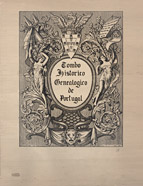

................................
The creation of the Tombo Histórico e Genealógico de Portugal [Historical and Genealogical Archives of Portugal] resulted from a private initiative by two researchers, Afonso de Dornelas and Alberto de Gusmão Navarro, who were also its owners and publishers. In this context, acknowledging its founders is justified. Founded in 1911, the Tombo Histórico Genealógico [Historical Genealogical Archives] aimed primarily to "publish studies of [genealogical and heraldic] nature to assist researchers and scholars, not only by providing support but also by disseminating their unpublished works" (Afonso de Dornelas; Alberto de Gusmão Navarro, "Advertência" [Warning], Tombo Histórico Genealógico vol. 1, p. 3). From the second volume onwards, the publication's title changed to Tombo Histórico Genealógico de Portugal .
Afonso de Dornelas (1880–1944) was a military officer, researcher, and doctor of science from the Oriental University in Washington. He joined the army in 1897 and participated, as a sergeant, in the Hunter Regiment 6 expedition to Mozambique in 1899. In 1909, he joined the Red Cross, where he held various positions. Dornelas was the founder of the Instituto Português de Heráldica [Portuguese Institute of Heraldry], the Conselho Nobiliárquico de Portugal [Portugal's Nobiliary Council], and the Instituto Histórico de Sintra [Sintra Historical Institute]. Additionally, he was a founding member of the Academia Portuguesa da História [Portuguese Academy of History] and served as its first secretary-general. Afonso de Dornelas also made significant contributions to the Associação dos Arqueólogos Portugueses [Association of Portuguese Archaeologists]. As a scholar, he devoted much of his research to genealogy and heraldry, emerging as one of the leading figures in this field in Portugal. His work includes articles published in the Tombo Histórico e Genealógico de Portugal as well as notable publications such as História e Genealogia [History and Genealogy] (14 volumes), Elucidário Nobiliárquico [Nobiliary Elucidarium] (2 volumes), and Apontamentos [Notes] (2 volumes). Regarding his methodology, Afonso Dornelas developed a critical approach that emphasised meticulous attention to detail. This dedication is evident in one of his articles in the Tombo Histórico e Genealógico de Portugal, where he states: "I spent years going through public and private, national and foreign libraries and archives and reading everything I could think of that could provide me with elements to strengthen the foundations of such a remarkable monument as the history of a family. It is a time-consuming and labour-intensive endeavour, requiring not imagination but great courage, to meticulously study and reorganise a family in detail and all its intricacies, which has accompanied step by step the life of a nation from its origin to the present" ("Dornelas-origem d'este apelido" [Dornelas—origin of this surname], Tombo Histórico e Genealógico de Portugal vol. I, p. 90). Dornelas also made significant contributions to historiography, particularly through his studies on the Portuguese presence in Morocco. These works earned him an invitation to participate in the official commemorations of the fifth centenary of the capture of Ceuta and the fourth centenary of the death of Afonso de Albuquerque in 1915. Afonso Dornelas was one of the most prestigious figures of his time, enjoying broad public recognition, as demonstrated by the numerous positions he held and the honours he received throughout his life.
This work is financed by national funds through FCT - Foundation for Science and Technology, I.P, in the scope of the projects UIDB/04311/2020 and UIDP/04311/2020.
